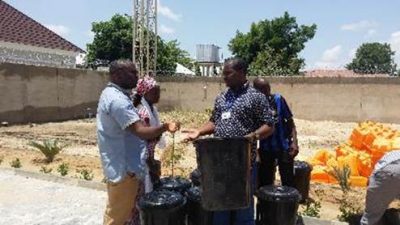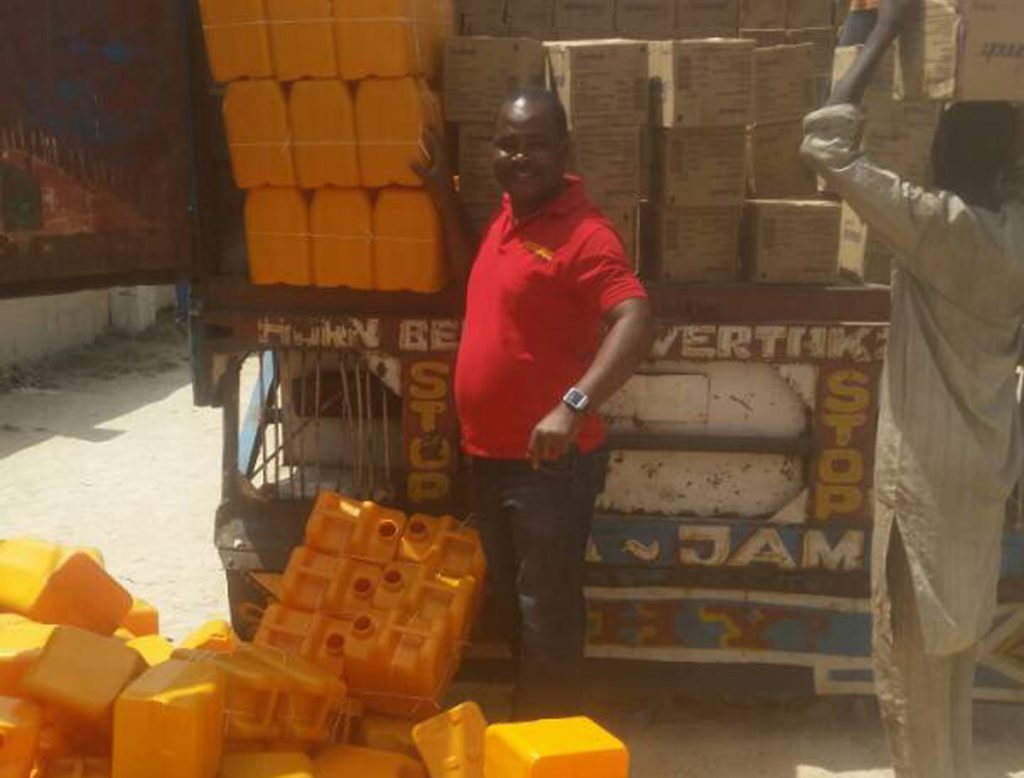Logistics is like a link chain—it’s only as strong as its weakest link. Each piece has to connect firmly with the next or the whole system breaks down. We have to make sure the right people, the right skills, and the right materials are all in the right place at the right time. This might sound simple, but when you’re working in challenging environments like northeastern Nigeria and South Sudan where program locations are often hard-to-reach and rife with insecurity, it is anything but.
Earlier this year, I deployed to South Sudan as part of International Medical Corps’ famine emergency response team. Our first priority was to set up new operations in the town of Nyal, located in a remote northern corner of South Sudan. surrounded by a giant swamp known as the Sudd, where thousands of families have fled seeking refuge from fighting and famine in nearby counties.
To provide the displaced with medical care, treatment for malnutrition, and other services, we had to procure and ship the required materials up to Nyal. With no passable roads—especially during rainy season—our only option was to airlift everything we needed to start our base and run our programs. This included everything from medicine and nutrition supplies for those in desperate need of both, to the basic necessities our staff required to survive and work.

We built a compound from scratch that now serves as our office and staff accommodation in Nyal. We transported the timber, cement, and other building materials by road from the capital, Juba, to the town of Rumbek, roughly halfway to Nyal. There we transferred everything onto light aircraft for the final leg into Nyal. Once materials arrived in Nyal, we had to hire local contractors and day laborers to build the entire base from scratch.
It took us about a month to complete, but today, our team in Nyal is living and working there, providing thousands of medical consultations to people each month. I feel proud to have played a part in giving them the supplies and environment they need to deliver these programs.
I then deployed to northeastern Nigeria, where International Medical Corps is scaling up programs to serve tens of thousands of people who were forced from their homes by the militant group Boko Haram. Much as in South Sudan, conditions in Nigeria are difficult. Millions of people are unsure where their next meal is coming from and malnutrition is rampant, especially among children. Logistics delays mean that people go without the services they need to survive.
When I arrived in Maiduguri, the capital of Borno State, the epicenter of the Boko Haram crisis, there was tremendous pressure to procure large amounts of supplies needed by our program teams to provide lifesaving care to our beneficiaries.
This was especially true for our water, sanitation, and hygiene (WASH) programs, which required simple items like waste baskets and wheelbarrows but also massive toolkits to rehabilitate boreholes and build hand-pumps. I worked closely with our WASH technical supervisor and the Maiduguri team to prioritize what was needed where and when. I then worked with suppliers to get all the orders completed and—ultimately—help fulfil our mission: to provide camp and community residents access to safe drinking water and improved sanitation and hygiene.
Whenever I visit an International Medical Corps program site and talk with beneficiaries, whether in a displacement camp or a stabilization center where we treat severely malnourished children, I realize how much appreciation there is for our work. I also realize how much there is to learn from camp and community residents. Because of this, I find it a must on every assignment to visit personally our program sites and talk with—and listen to–local residents. I like the work I do. It is very fulfilling and I’m grateful to be able to contribute to making this lifesaving work happen.
Another big part of my job is training. In Nyal, for example, we hired new staff who required training on our procurement procedures so they could get the required supplies on time, while also complying with donor regulations. Similarly, in Nigeria, I trained a staff of more than 70 program and logistics officers on the International Medical Corps procurement procedures, while also hiring five new logisticians so that the Maiduguri team had sufficient logistics support to deliver our programs. This training is crucial. As we know, if our logistics are ineffective or stalled, then our program delivery schedule quickly follows.
Regardless of how well trained and prepared our teams are, there is always a chance that something could go wrong, given the environments in which we work. This is why over 19 years working as a logistician, I have come to learn—and rely on—an important professional motto: “remain flexible to local realities and be ready to adjust to accommodate them based on the local context.”
I always make contingency plans and do not take for granted that our work will happen as expected. I have to be prepared and ready to respond to whatever is thrown my way because logistics delays literally can cost lives. When you are a humanitarian logistician, every day, every hour, and every minute is precious.
As a roving logistics coordinator, I have found International Medical Corps different from other organizations that I have worked with. Here, we are continuously developing more efficient ways of working and finding better ways to support the systems we use in different countries. It’s gratifying to work with committed people who have the same vision that I have–people who share the same concerns about the world, who share the same hope that we can do something a better way so we can deliver key materials faster in order to achieve our goal: to save lives and reduce human suffering.
